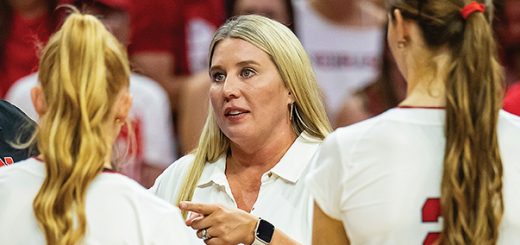Natural History at the University of Nebraska State Museum-Morrill Hall

by Caroline Clements
“Science knows no country, because knowledge belongs to humanity, and is the torch which illuminates the world.” —Louis Pasteur, French chemist, 1822-1895.
When a person visits the University of Nebraska State Museum-Morrill Hall, they do more than enter a natural history museum – they enter a place where curiosity is rewarded, and exploration encouraged. Inside this museum, researchers and staff work to not only celebrate science and the humanities but share the museum’s exhibits and programs with as many people as possible.
“Science should be accessible to everyone,” said UNSM director Dr. Susan Weller. “That’s why our museum has a variety of initiatives to increase access and why we’re constantly evaluating new opportunities to serve our community. We want to welcome people who otherwise may not visit.”
In the late fall of 2019, several museum staff attended a meeting where data showed a growing population of children and families in Lincoln were facing educational and financial hurdles. In response, Morrill Hall joined the Museums for All program in January 2020. A signature access program of the Institute of Museum and Library Services, Museums for All encourages people of all backgrounds to visit museums regularly by reducing admission fees. Under the program, visitors to Morrill Hall who qualify for WIC, EBT or SNAP benefits pay $1 admission. The program also includes $1 access to the museum’s annual events like Fossil Day, Dinosaurs & Disasters, and Archie’s Party. Since its launch, more than 4,000 visitors have explored Morrill Hall through Museums for All.
When Covid-19 reached Lincoln, staff pivoted to provide free virtual content during the shut-down for residents across the city and state. The surge in demand for science learning and activities inspired staff conversations on how to further increase accessibility to physical museum locations once they reopened.
“As the pandemic progressed, we saw the economic impacts it had on families in our communities,” said Weller. “We realized that for some families, even the $1 Museums for All admission may be a barrier to visiting our museum.”
In December 2020, the museum launched its new Community Access Program (CAP). The program allows museum members and visitors to support a Lincoln-based community organization during every seasonal membership drive. For each membership purchased or renewed during the drive period, UNSM donates two free Morrill Hall passes. Members and visitors can donate additional passes. Organizations are either nominated by staff, UNSM members, or directors from the Friends of the State Museum. An organization can also nominate itself for consideration. Each nominated organization is evaluated based on their mission, audience served, and potential to provide access to community members who may otherwise be unable to visit museums. More than 1,200 passes were donated during the first eight drives to The Malone Center, F Street Community Center, CEDARS, Friendship Home, People’s City Mission, Lighthouse, Lincoln Literacy, and St. Monica’s.
But bringing visitors to the museum isn’t the only way Morrill Hall is providing science accessibility. The museum also offers Virtual Learning Programs where a museum educator connects live to classrooms to provide natural history lessons.
“Distance can be a barrier for many schools, preventing them from visiting Morrill Hall or our other UNSM sites,” said UNSM education supervisor Emily Osberg-Brown. “Our Virtual Learning Programs are an excellent interactive tool that expose students to our state’s wonderful natural history and connect them to science experts.”
The museum provides more than a dozen different virtual programs for teachers to choose from. And while program cost can also be a barrier, support from donors allows the museum to provide scholarships for many schools. For the 2022-2023 school year, gifts from the Rogers Foundation, the Dillon Foundation, and Friends of the University of Nebraska State Museum, allowed the museum to provide free programs to all Nebraska schools, including accredited afterschool programs.
“Since 2017, the Rogers Foundation has enabled us to provide free Virtual Learning Programs to rural Nebraska schools,” said Osberg-Brown. “Because of their support, schools unable to visit due to distance or budgets, had the opportunity to explore science, art, and social studies topics. As the state’s museum of natural history though, it is important that we create more accessibility for schools. The additional gifts and support for the 2023 school year are exciting as they allow us to reach more schools across the state.”
“Curiosity has no limits,” said Weller. “Our goal as a museum is to provide as many members of our community as possible the opportunity to explore, learn, and engage their curiosity.”
Those interested in information regarding volunteering with the museum, supporting education programs, or supporting exhibit and accessibility opportunities can contact morrillhall@unl.edu.
Those wanting additional information on the Community Access Program or wishing to nominate an organization can contact unsmmembership@unl.edu.



Recent Comments